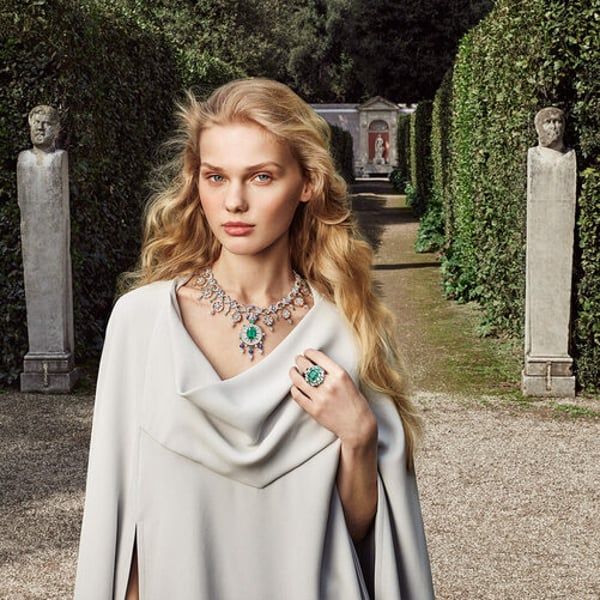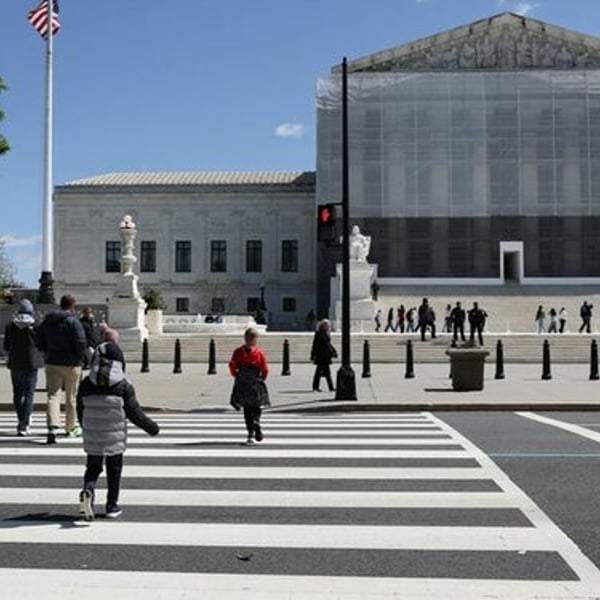By
Bloomberg
Published
February 1, 2024
The wolf licks his lips. The prisoner is not wearing a red hooded cape, but rather jewelry by Van Cleef Arpels.
Bernard Arnault, founder and chief executive of LVMH, known as the “cashmere wolf,” last week praised Van Cleef's owner, Cie Financiere Richemont SA, and joked that if its chairman, Johann Rupert, wanted “support for maintain your independence, I will be there.”
It was a strange thing to say and it's unclear what Arnault was referring to. Perhaps it was a joke, but it raises questions about Richemont's status: whether he needs a partner and what exactly Arnault could gain from such a show of solidarity. Not surprisingly, the comment, on LVMH's earnings call last week, reignited speculation that he is eyeing a Richemont acquisition. If so, the tricky part will be persuading Rupert that he needs help.
A combination of LVMH Moët Hennessy Louis Vuitton SE and Richemont would certainly be convincing. He would create a jewelry powerhouse, bringing together Tiffany, which joined the Arnault group three years ago, and sister house Bulgari, with Van Cleef and Cartier, another Richemont property enjoying a surge in popularity. Add to this LVMH's Louis Vuitton, the world's largest luxury brand, as well as its smaller Dior, and LVMH would be in a completely different stratosphere.
And LVMH can afford it. Assuming the standard 30% acquisition premium, Richemont would be valued at around 100 billion Swiss francs ($116 billion). An all-cash deal might be a stretch, but it could raise funds by selling assets, such as a stake in its wine and spirits division to partner Diageo Plc, or through a stock listing. The entire drinks business could have an enterprise value of around €30 billion ($32 billion). LVMH could use a mix of cash and shares. (For the purposes of this exercise, we will skip the issue of competitive concerns.)

The main drawback would be that Rupert has made it very clear that Richemont is not for sale: he said in May that he had decided not to do a deal with rival Kering SA two years earlier, when investment bankers proposed one. And he will determine the fate of Richemont, because he has about 10% of the share capital and 51% of the voting rights.
Richemont does not need Arnault's support at this time. Two weeks ago, he reported better-than-expected sales, thanks to brilliant demand for jewelry. One thesis among investors is that, given the aggressive price increases for handbags over the past three years, jewelry is now a better value for high-end buyers. Richemont also has a strong balance sheet, with net cash of €6.8 billion at the end of December.
There is one area where LVMH could help: taking Yoox-Net-a-Porter out of Richemont's hands, after a deal to sell a stake to Farfetch Ltd fell through. That would certainly benefit Richemont's independent investment history. , but it's unclear what he would do for LVMH.
Like LVMH, Richemont will eventually have to deal with Rupert's succession. Both he and Arnault are over 70 years old. Richemont already has an outside CEO, Jerome Lambert, and Cyrille Vigneron, Cartier's chief executive officer, is another powerful executive. Rupert's son Anton is also on the board of directors. But Rupert, as president and majority shareholder, is at the center of it all. From the outside it is not clear how the patriarch could take a step back if he wanted to. While the world is paralyzed by the transition to the next generation at LVMH, the problem will also become more evident at Richemont.
Could Rupert be convinced to entrust the company to LVMH, where it could remain in the long term as one of the most important brands managed by the undisputed leader of the industry? If so, the Rupert family would have to share the benefits.

Perhaps an alliance in which LVMH takes a minority stake could be the first step. The transaction that LVMH's great rival, Kering, closed last year to acquire a 30% stake in Valentino, with the option to buy 100% at a later date, could already have set a precedent.
LVMH typically prefers majority deals, although it has long held a minority stake in Tod's SpA. But Arnault may be willing to make an exception for Richemont, because in the luxury sector, once a prized asset is lost, it's usually gone forever. . There may be another reason: Kering, who I have long maintained is the best partner for Richemont, would have difficulty taking action at this time. The company is busy trying to revitalize Gucci, integrating the Creed premium perfume brand and making the most of the relationship with Valentino.
If LVMH were to acquire a stake in Richemont, another sensitive question would be whether this would prevent the Swiss company from closing another deal. Kering may not be out of the game forever, and with Richemont's market value now significantly higher than that of the French company, Rupert would have the advantage, perhaps making this combination more palatable.
Rupert said in May that he and Arnault were in “constant dialogue and we respect each other's independence.”
The admiration is mutual. Last week, Arnault described Rupert as “an outstanding leader, and I have no desire to alter his strategy.”
But that didn't stop him from taking another step. This may be because Rupert, and not Arnault, is the kingmaker of luxury. If he ever decides to collaborate, and who he chooses as a partner, he will determine the balance of power in the industry. It's no wonder Arnault wanted to send the message that when that time comes, he'll be ready.












